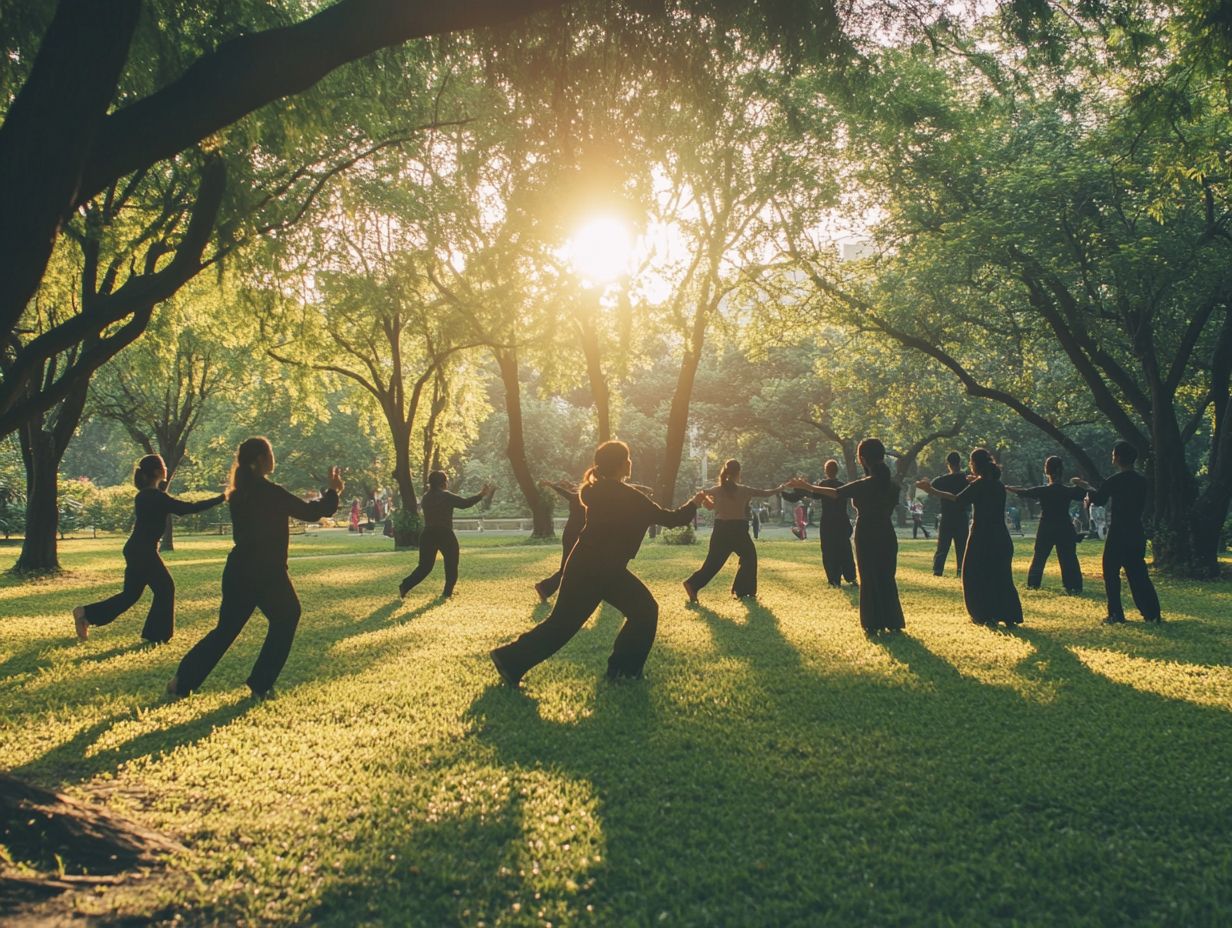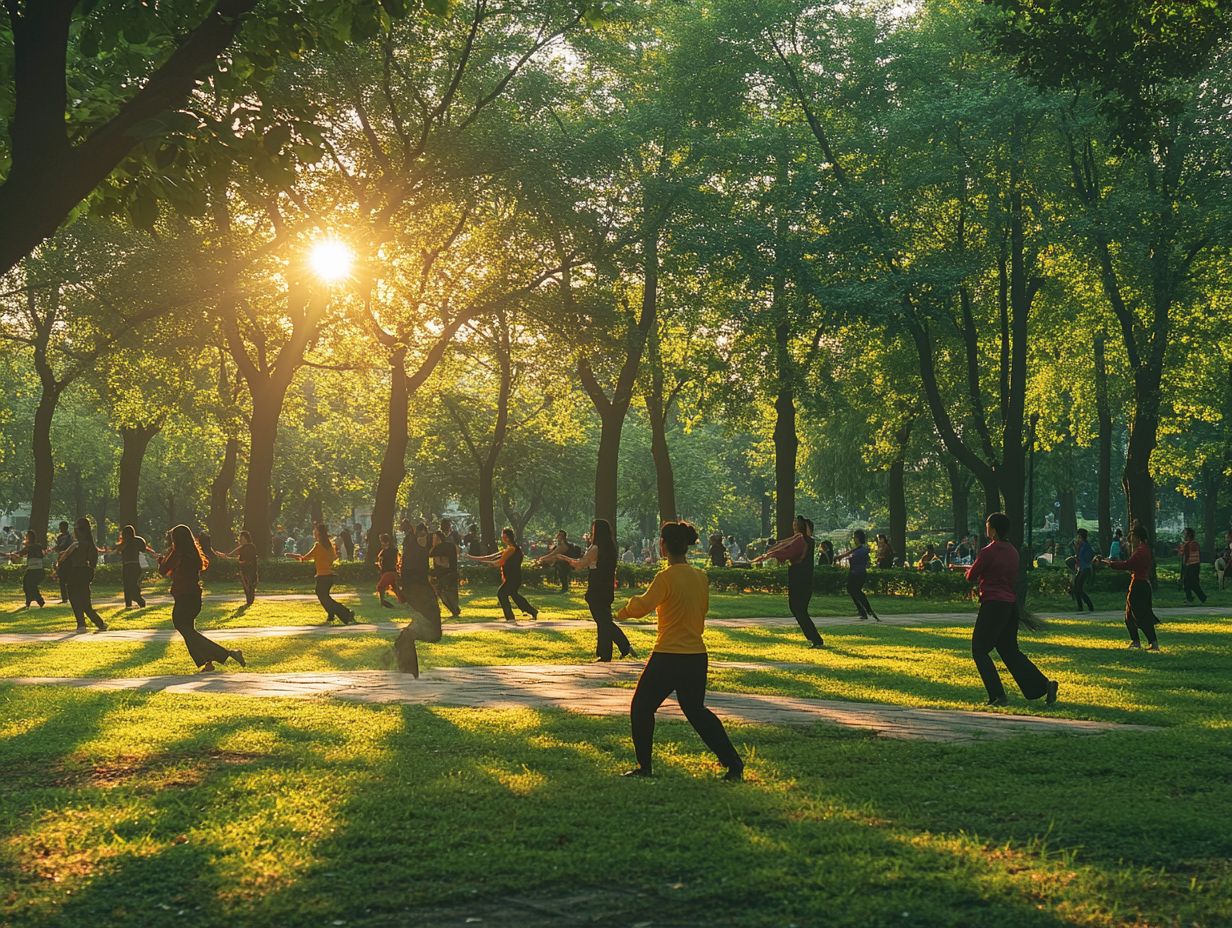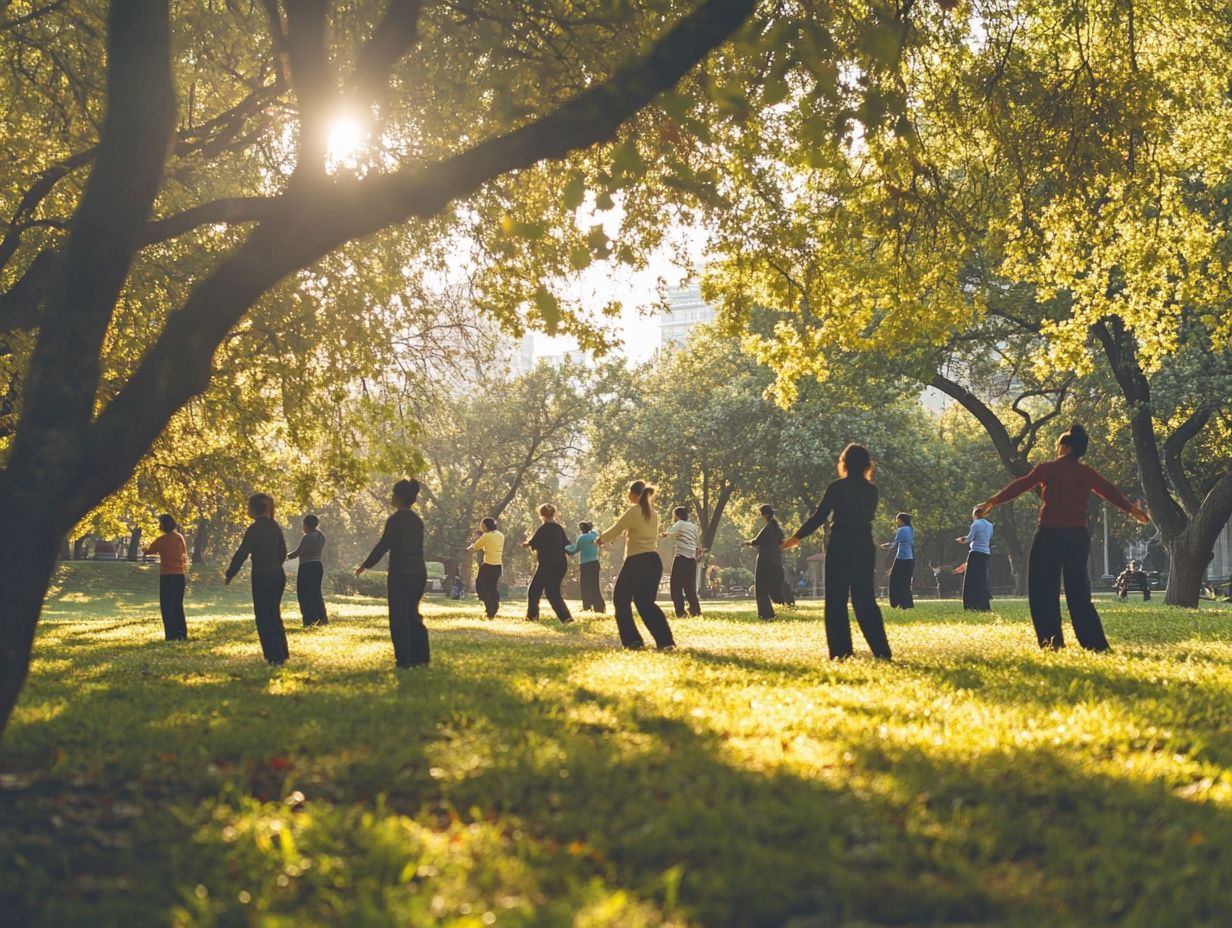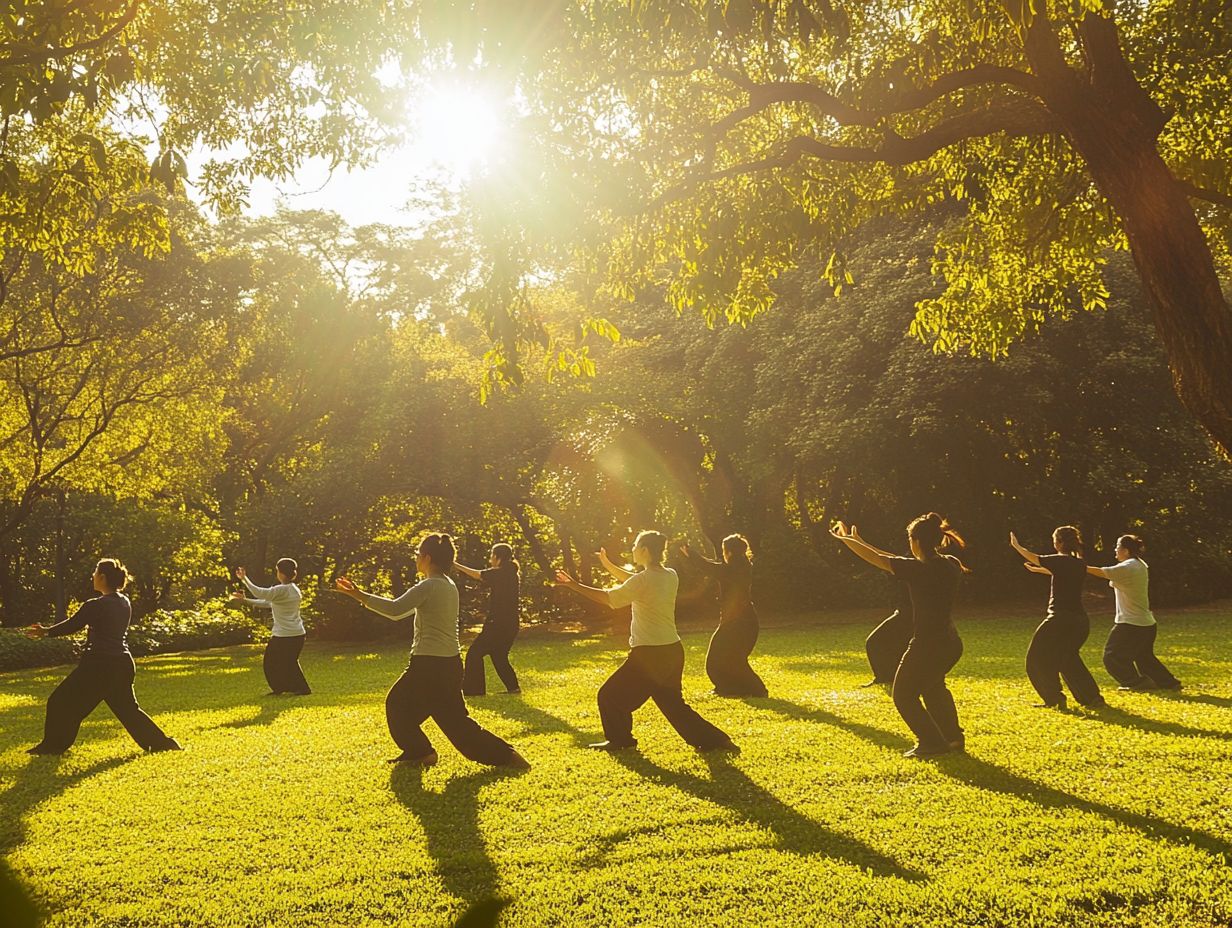Exploring the Benefits of Tai Chi for Anxiety
Anxiety is a prevalent challenge that impacts many individuals, often leading to a host of physical and emotional difficulties. Recognizing its symptoms is your first step toward effective management of this condition.
One ancient practice that is increasingly acknowledged for its soothing effects is Tai Chi, a gentle form of martial arts steeped in centuries of tradition. This article delves into how Tai Chi can be a valuable tool for alleviating anxiety, offering a step-by-step guide tailored for beginners, sharing research-supported benefits, and highlighting additional health benefits.
You’ll find important precautions outlined to ensure a safe practice. Start incorporating Tai Chi today to boost your mental well-being!
Contents
- Key Takeaways:
- Anxiety and its Impact on Health
- Tai Chi for Anxiety
- How to Practice Tai Chi for Anxiety
- More Ways Tai Chi Improves Health
- Precautions and Considerations
- Frequently Asked Questions
- What Is Tai Chi?
- How Can Practicing Tai Chi Benefit Those with Anxiety?
- Are There Any Specific Tai Chi Exercises That Can Help with Anxiety?
- Is Tai Chi Suitable for People of All Ages and Fitness Levels?
- How Often Should I Practice Tai Chi to See the Benefits for Anxiety?
- Are There Any Other Benefits of Practicing Tai Chi for Anxiety?
Key Takeaways:

- Tai Chi is a gentle and low-impact form of exercise that can help reduce anxiety symptoms and promote overall well-being.
- Practicing Tai Chi can also improve physical health, muscle strength, balance, and flexibility while reducing stress and tension in the body.
- It is important to consult with a healthcare professional before starting Tai Chi and to listen to your body during practice to avoid injury or discomfort, particularly if you have long-term health issues.
Anxiety and its Impact on Health
Anxiety is a widespread mental health condition that profoundly affects both your emotional stability and physical health. It frequently paves the way for long-term health issues and stress-related complications. This complex condition can present itself through a variety of symptoms, such as persistent worry and restlessness.
Recognizing its effects is essential not just for your own health, but also for implementing effective therapeutic treatments within healthcare systems. Embracing mindful practices like deep breathing and relaxation techniques can significantly enhance your overall well-being.
Understanding Anxiety and its Symptoms
Anxiety presents itself through a range of symptoms that can profoundly impact your mental health and emotional stability. These include restlessness, irritability, and physical discomfort. Understanding these symptoms is crucial for effective management.
These manifestations often signal deeper emotional turbulence, making it difficult for you to engage in daily activities without feeling overwhelmed. It goes beyond mere occasional worry; if you find yourself grappling with more pervasive anxiety, you might be dealing with conditions like generalized anxiety disorder or panic disorder. Such disorders require thoughtful approaches, including mindfulness and Tai Chi practice.
These disorders can disrupt not only your personal relationships but also impede your professional responsibilities, fostering feelings of isolation and low self-esteem. You may also encounter racing thoughts or difficulty concentrating, which can further complicate your ability to manage stressors effectively. This shows how closely anxiety is linked to your emotional health.
History and Principles of Tai Chi
Tai Chi is an ancient practice steeped in the wisdom of traditional Chinese medicine. It focuses on slow, intentional movements that promote relaxation and enhance both physical and mental health.
Originating over 700 years ago, Tai Chi has gracefully transformed from a martial arts practice into a holistic wellness approach, seamlessly integrating its core principles of balance, harmony, and flow. Engaging in slow, deliberate postures aligns your body and mind, cultivating a heightened awareness of your breath and movements. This harmonious synergy invites you to connect deeply with your inner self while also sharpening your bodily awareness.
The therapeutic benefits of Tai Chi are closely intertwined with traditional Chinese medicine, which perceives health as a balance of energy, or Qi (the vital energy flowing in the body). By committing to these principles on a regular basis, you can unlock significant improvements in mental clarity, reduce stress, and elevate your overall vitality.
Tai Chi for Anxiety

Tai Chi offers a refined approach to alleviating anxiety using gentle movements paired with deep breathing techniques to elevate your mental health and overall well-being.
How Tai Chi Helps Reduce Anxiety
Numerous studies underscore the benefits of Tai Chi for anxiety, revealing significant improvements in mental well-being and reductions in symptoms linked to chronic diseases.
Research published in the Journal of Affective Disorders shows that individuals who engage in Tai Chi report lower anxiety levels and an enhanced mood compared to those who opt for traditional exercises.
Findings from a comprehensive review of several studies further highlight its effectiveness as a complementary treatment, presenting a gentle yet impactful method for managing anxiety disorders.
Tai Chi adds value to healthcare frameworks, particularly within mental health therapies, offering a holistic approach to well-being and improving cognitive function.
By helping you stay fit and mentally strong, Tai Chi could indeed play a pivotal role in transforming treatment paradigms for anxiety.
How to Practice Tai Chi for Anxiety
As a beginner, you’ll find this approach incredibly helpful. Practicing Tai Chi for anxiety involves engaging in a series of mindful, gentle movements designed to promote relaxation and enhance mental clarity.
This method helps you achieve effective exercise goals while cultivating a sense of peace and balance in your daily life, and can aid in improving breathing patterns.
Step-by-Step Guide for Beginners
Your Tai Chi journey begins with mastering fundamental movement techniques and incorporating deep breathing techniques to achieve maximum relaxation.
This approach enhances your physical health while nurturing mental clarity and emotional balance.
Start by familiarizing yourself with foundational postures like the ‘Beginning Tai Chi‘ stance, which establishes a stable base.
Once you have that down, practice flowing movements like ‘Wave Hands Like Clouds‘ to cultivate fluidity and grace.
It’s essential to integrate deep abdominal breathing throughout these exercises, allowing your life energy to circulate effectively.
As you progress, you may find it beneficial to delve into Tai Chi’s philosophical principles, which emphasize harmony and mindfulness in each fluid motion.
More Ways Tai Chi Improves Health

Along with providing relief from anxiety, Tai Chi presents a wealth of health benefits that enhance your overall well-being.
You can expect to see improvements in muscle strength, joint health, and balance, all of which contribute to a more harmonious and energized life.
Improving Overall Health and Well-being
Tai Chi plays a significant role in enhancing your overall health and well-being, offering benefits for both mental and physical health.
It helps manage chronic diseases and can reduce fall risk in aging patients.
Engaging in this ancient martial art not only promotes relaxation and lowers stress levels but also encourages balance and flexibility key advantages for anyone grappling with conditions like arthritis or heart disease.
You may find that your mood and cognitive function improve, making Tai Chi a valuable ally against challenges such as depression and anxiety.
Its gentle nature makes Tai Chi accessible to individuals of all ages and fitness levels, inviting everyone to partake in a practice that nurtures both body and mind.
By weaving this holistic approach into your wellness routine, you might discover a profound enhancement in your quality of life.
Precautions and Considerations
While Tai Chi is typically a low-impact exercise that many can enjoy, it’s crucial for you to take precautions and prioritize safety, particularly if you have specific health conditions such as chronic obstructive pulmonary disease, fibromyalgia symptoms, or balance disorders.
Start your Tai Chi journey today and experience the benefits for yourself!
In conclusion, Tai Chi offers transformative benefits that can enhance both your mental and physical well-being. Don t wait begin practicing Tai Chi to discover its incredible effects on anxiety and overall quality of life!
Safety Measures and Who Should Avoid Tai Chi
When practicing Tai Chi, prioritize safety measures and be mindful of any health conditions that might require you to avoid certain movements.
Some health issues can limit your ability to engage in Tai Chi. These include arthritis, balance disorders (conditions that affect stability), and serious cardiovascular conditions. Always check with a healthcare professional to stay safe before starting Tai Chi, especially if you have existing medical concerns.
Listening to your body is key. Being open to modifications can make a significant difference. For example, if you experience joint pain, slower-paced practices may be more beneficial. People with balance issues may need a stable surface or the support of a chair to feel secure initially.
By adapting Tai Chi to suit your individual needs, you can enhance the benefits of your practice while keeping safety at the forefront.
Frequently Asked Questions

What Is Tai Chi?
Tai Chi is an ancient Chinese martial art that combines gentle movements, deep breathing, and mindfulness techniques to promote physical, mental, and emotional well-being.
How Can Practicing Tai Chi Benefit Those with Anxiety?
Tai Chi reduces stress and anxiety by promoting relaxation, improving mood, and increasing self-awareness. It can also decrease muscle tension, improve sleep quality, and boost overall physical health.
Are There Any Specific Tai Chi Exercises That Can Help with Anxiety?
- Opening and Closing movement
- Grasping the Sparrow’s Tail
- Cloud Hands
Is Tai Chi Suitable for People of All Ages and Fitness Levels?
Yes, Tai Chi is a low-impact exercise accessible to people of all ages and fitness levels. It can be adapted to meet each individual’s needs and abilities.
How Often Should I Practice Tai Chi to See the Benefits for Anxiety?
The frequency of Tai Chi practice varies by individual. Generally, practicing at least two to three times a week can lead to noticeable improvements in anxiety levels. Consistency is key for long-term benefits.
Are There Any Other Benefits of Practicing Tai Chi for Anxiety?
Tai Chi improves overall mental health and well-being, enhances cognitive function, increases flexibility and balance, and promotes a sense of calm and inner peace.
Start your Tai Chi journey today for a calmer, healthier life!






